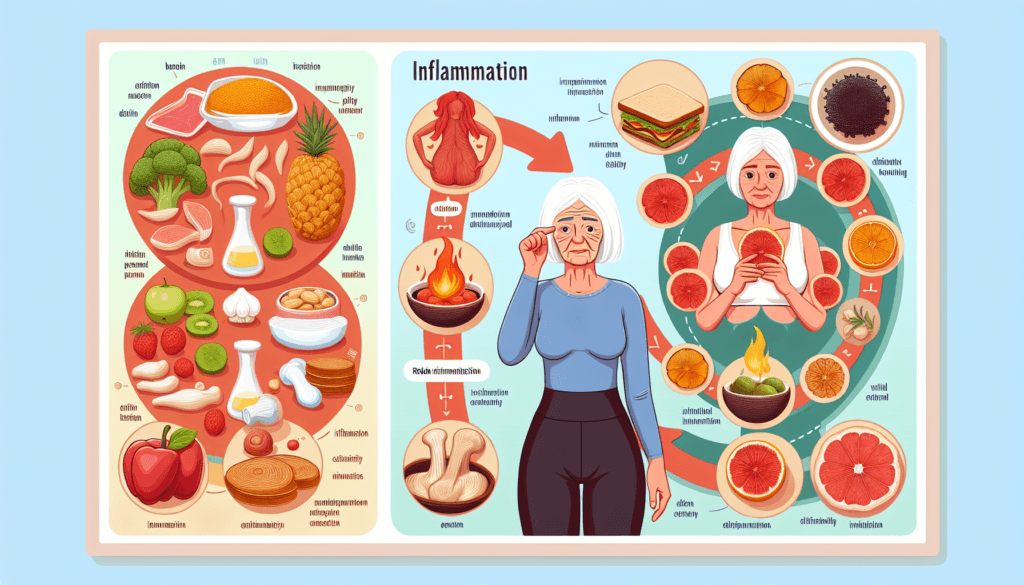Are you a boomer looking to improve your health and reduce inflammation? Look no further! This article explores the various ways boomers can reduce inflammation through their diet. Discover the powerful impact that certain foods can have on inflammation levels in the body and learn practical tips to incorporate these foods into your daily meals. Say goodbye to joint pain and discomfort and embrace a healthier, more vibrant lifestyle by harnessing the potential of your diet.

Understanding Inflammation
Inflammation is a natural response that occurs in the body when it is injured or under attack from harmful stimuli such as bacteria or viruses. It is a crucial part of the immune system’s defense mechanism. However, when inflammation becomes chronic, it can lead to various health problems, including heart disease, arthritis, and even cancer.
What is inflammation?
Inflammation is the body’s way of protecting itself and fighting against harmful substances. When an injury occurs or there is an infection, the body releases chemicals that cause blood vessels to widen and become more permeable. This allows immune cells to travel to the affected area and initiate the healing process. While acute inflammation is essential for the body’s defense mechanism, chronic inflammation can lead to long-term health complications.
Causes of inflammation
There are several factors that can contribute to chronic inflammation, including poor diet, stress, lack of exercise, smoking, and excessive alcohol consumption. In addition, certain medical conditions, such as autoimmune disorders, can also lead to chronic inflammation. Understanding the causes of inflammation is crucial in developing strategies to reduce it and promote overall well-being.
Importance of Diet in Reducing Inflammation
Research has shown that diet plays a significant role in reducing inflammation. The foods we consume can either fuel or inhibit the inflammatory response in the body. By incorporating anti-inflammatory foods into our diet, we can support our immune system and reduce the risk of chronic inflammation-related diseases.
Connection between diet and inflammation
The food we eat has a direct impact on our body’s inflammatory response. Consuming a diet rich in processed foods, refined carbohydrates, and unhealthy fats can lead to an increase in inflammation. On the other hand, a diet that includes whole foods, healthy fats, and an abundance of fruits and vegetables can have a calming effect on inflammation.
Dietary factors that contribute to inflammation
Several dietary factors have been identified as contributors to inflammation. These include high intake of sugar, saturated fats, trans fats, and refined carbohydrates. Additionally, consuming excessive amounts of processed meats, alcohol, and foods containing artificial additives and preservatives can also increase inflammation in the body. It is important to be mindful of these dietary factors and make conscious choices to reduce inflammation.

Anti-Inflammatory Foods for Boomers
Boomers can benefit greatly from incorporating anti-inflammatory foods into their diet. By focusing on nutrient-dense options, boomers can support their overall health and well-being. Here are some key food groups that can have a positive impact on reducing inflammation:
Fruits and vegetables
Including a variety of fruits and vegetables in your diet is essential for reducing inflammation. Colorful options like dark leafy greens, berries, and citrus fruits are rich in antioxidants and phytochemicals, which have been shown to have anti-inflammatory properties. Aim for a diverse range of fruits and vegetables to reap the maximum benefit.
Healthy fats and oils
Incorporating healthy fats into your diet is crucial for reducing inflammation. Foods such as avocados, nuts, and olive oil contain monounsaturated fats and omega-3 fatty acids, which have been shown to have anti-inflammatory effects. Including these healthy fats in your meals not only adds flavor but can also help reduce inflammation in the body.
Whole grains
Choosing whole grains over refined grains is a smart choice for reducing inflammation. Whole grains like quinoa and brown rice contain fiber, vitamins, and minerals that can help regulate the body’s inflammatory response. These nutrient-dense grains should be a staple in the boomer’s diet.
Protein sources
Opting for lean protein sources such as fatty fish, poultry, and legumes can have a positive impact on reducing inflammation. Fatty fish like salmon, tuna, and mackerel are especially rich in omega-3 fatty acids, which have been shown to have anti-inflammatory properties. Including a variety of protein sources in your diet ensures a well-rounded and anti-inflammatory meal plan.
Spices and herbs
Certain spices and herbs have been found to have anti-inflammatory properties. Turmeric and ginger, in particular, are known for their powerful anti-inflammatory compounds. Incorporating these spices into your cooking or adding them to smoothies and teas can offer both flavor and inflammation-fighting benefits.
Specific Foods to Include in the Diet
In addition to the food groups mentioned above, there are specific foods that boomers should consider including in their diet to further reduce inflammation. These foods have been associated with a decrease in inflammation and can be easily incorporated into daily meals:
Dark leafy greens
Dark leafy greens such as kale, spinach, and Swiss chard are packed with vitamins, minerals, and antioxidants known to reduce inflammation. They can be enjoyed in salads, as a side dish, or added to smoothies for an added nutritional boost.
Berries and citrus fruits
Berries, including blueberries, strawberries, and raspberries, are rich in antioxidants, which have been shown to combat inflammation. Citrus fruits like oranges, grapefruits, and lemons are also high in vitamin C, which may help reduce inflammation. Including these fruits in your diet can provide a refreshing and anti-inflammatory addition to your meals and snacks.
Avocados and nuts
Avocados are a great source of healthy fats and fiber. They contain monounsaturated fats that have been linked to reduced inflammation and improved heart health. Nuts, such as almonds and walnuts, are also high in healthy fats and can be a satisfying and anti-inflammatory snack option.
Quinoa and brown rice
Whole grains like quinoa and brown rice provide a good source of fiber, vitamins, and minerals. These whole grains have a low glycemic index and can help regulate blood sugar levels, which in turn can help reduce inflammation in the body.
Fatty fish
Fatty fish like salmon, sardines, and trout are abundant in omega-3 fatty acids. These healthy fats have been widely studied for their anti-inflammatory benefits. Including fatty fish in your diet a few times a week can provide an excellent source of omega-3 fatty acids and help reduce inflammation.
Turmeric and ginger
Turmeric and ginger are both known for their anti-inflammatory properties. Curcumin, the active ingredient in turmeric, has been shown to inhibit the molecules involved in inflammation. Ginger, on the other hand, contains gingerol, which has been found to have anti-inflammatory effects. Adding turmeric and ginger to your meals or enjoying them in tea can be a flavorful way to reduce inflammation.

The Role of Omega-3 Fatty Acids
Omega-3 fatty acids are a type of healthy fat that has been extensively studied for its anti-inflammatory properties. They play a crucial role in reducing inflammation in the body and are essential for overall health.
Benefits of omega-3 fatty acids
Including omega-3 fatty acids in your diet can offer numerous health benefits. These healthy fats have been shown to reduce inflammation, lower triglyceride levels, improve heart health, and support brain function. Omega-3 fatty acids are also important for healthy skin, hair, and nails.
Sources of omega-3 fatty acids
Fatty fish, such as salmon, mackerel, and trout, are excellent sources of omega-3 fatty acids. Plant-based sources include flaxseeds, chia seeds, walnuts, and hemp seeds. Incorporating these foods into your diet can provide an adequate amount of omega-3 fatty acids and help reduce inflammation.
Foods to Avoid for Inflammation Reduction
In addition to incorporating anti-inflammatory foods into your diet, it is important to be mindful of certain foods that can contribute to inflammation. By reducing or avoiding these foods, boomers can further reduce their risk of chronic inflammation-related diseases.
Added sugars and refined carbohydrates
Foods high in added sugars and refined carbohydrates, such as soda, candy, white bread, and pastries, can cause a spike in blood sugar levels and promote inflammation. It is best to limit the consumption of these foods and opt for healthier alternatives.
Processed and fried foods
Processed and fried foods often contain unhealthy fats, artificial additives, and preservatives that can trigger inflammation in the body. Avoiding or reducing the consumption of processed meats, fast food, and fried snacks can help lower inflammation levels.
Highly processed oils
Highly processed oils like vegetable, canola, and soybean oils are often high in omega-6 fatty acids, which can promote inflammation when consumed in excess. Opt for healthier oils like extra virgin olive oil, coconut oil, or avocado oil, which have anti-inflammatory properties.
Excessive alcohol
Excessive alcohol consumption can lead to increased inflammation in the body. It is important to consume alcohol in moderation and be aware of its potential impact on inflammation levels.
Artificial additives and preservatives
Many processed foods contain artificial additives and preservatives that can trigger inflammation. These additives are often found in packaged snacks, sodas, and fast food. Opt for whole, unprocessed foods whenever possible to minimize exposure to these inflammatory substances.

The Importance of Hydration
Staying hydrated is essential for reducing inflammation in the body. Dehydration can impair immune function and increase inflammation, so it is important to drink an adequate amount of water throughout the day.
Effect of dehydration on inflammation
When the body is dehydrated, it produces more histamine, a compound involved in the inflammatory response. This can lead to increased inflammation and contribute to various health problems. By staying hydrated, you can help reduce inflammation and support your body’s natural healing processes.
Recommended daily water intake
The recommended daily water intake varies depending on various factors, including age, sex, activity level, and overall health. However, a general guideline is to aim for at least 8 cups (64 ounces) of water per day. Remember to adjust your water intake based on your individual needs and consult with a healthcare professional if you have specific hydration requirements.
Balancing Macronutrients for Boomers
Achieving a balance of macronutrients is essential for overall health and reducing inflammation. By understanding the optimal ratio of carbohydrates, proteins, and fats, boomers can support their metabolism, immune system, and overall well-being.
Optimal ratio of carbohydrates, proteins, and fats
The ideal ratio of macronutrients can vary depending on individual needs and health goals. However, a general guideline for boomers is to aim for a balanced diet comprising approximately 50% carbohydrates, 30% healthy fats, and 20% protein. This balance ensures an adequate supply of energy, essential nutrients, and anti-inflammatory components.
Avoiding excesses and deficiencies
It is important to be mindful of avoiding excesses and deficiencies when it comes to macronutrients. Consuming an excessive amount of carbohydrates, unhealthy fats, or protein can lead to inflammation and other health issues. Similarly, a deficiency in any of these macronutrients can also disrupt the body’s balance and promote inflammation. Strive for moderation and variety in your diet to achieve optimal macronutrient balance.

The Role of Gut Health in Reducing Inflammation
Maintaining a healthy gut is crucial for reducing inflammation and promoting overall well-being. The gut houses trillions of bacteria that play a crucial role in supporting the immune system and regulating inflammation.
Importance of a healthy gut
A healthy gut is essential for a strong immune system and a balanced inflammatory response. The gut bacteria help break down food, produce essential nutrients, and play a key role in the regulation of the immune system. When the gut is healthy, inflammation is better controlled, leading to improved overall health.
Probiotic and prebiotic foods
Consuming probiotic and prebiotic foods can support a healthy gut and reduce inflammation. Probiotics are beneficial bacteria that can be found in fermented foods such as yogurt, kefir, sauerkraut, and kimchi. Prebiotics, on the other hand, are types of fiber that feed the beneficial bacteria in the gut. Foods rich in prebiotics include bananas, onions, garlic, and whole grains. Including these foods in your diet can help maintain a healthy gut microbiome and reduce inflammation.
Incorporating Anti-Inflammatory Diet into Lifestyle
Incorporating an anti-inflammatory diet into your lifestyle can be a gradual and sustainable process. By making small changes to your meal planning, cooking methods, grocery shopping habits, and reading food labels, you can successfully adopt a dietary approach that supports inflammation reduction.
Meal planning and preparation
Meal planning is an effective way to ensure a well-balanced diet and reduce inflammation. Take some time each week to plan your meals, focusing on incorporating anti-inflammatory foods and balanced macronutrients. Preparing meals in advance can also help you make healthier choices and avoid reaching for processed or convenience foods.
Healthy cooking methods
The cooking methods you choose can impact the nutritional value of your meals. Opt for healthier cooking methods such as grilling, steaming, baking, or sautéing, as these methods help retain nutrients and reduce the need for excessive oils and fats. Avoid deep-frying or using excessive amounts of oil, as these can trigger inflammation.
Smart grocery shopping
When grocery shopping, prioritize the purchase of whole, unprocessed foods. Shop the perimeter of the grocery store, as this is typically where fresh produce, lean proteins, and whole grains are located. Minimize the purchase of processed and packaged foods that often contain unhealthy fats, added sugars, and artificial additives.
Reading food labels
Reading food labels is essential for making informed and anti-inflammatory food choices. Be mindful of ingredients such as added sugars, unhealthy fats, and artificial additives. Choose foods with a short and recognizable ingredient list, and opt for those that prioritize whole, unprocessed ingredients.
By incorporating these strategies into your daily life, you can successfully adopt an anti-inflammatory diet and support your overall health and well-being. Remember that small changes over time can make a big difference, and always consult with a healthcare professional or registered dietitian before making any significant dietary changes.


